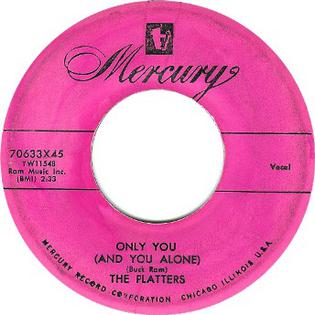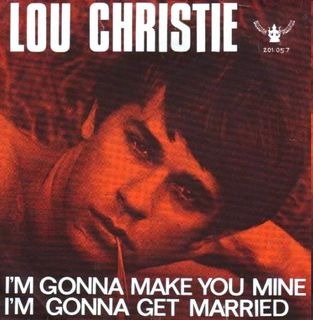Related Research Articles

"Only You (And You Alone)" (often shortened to "Only You") is a pop song composed by Buck Ram. It was originally recorded by The Platters with lead vocals by Tony Williams in 1955.

"Put Your Head on My Shoulder" is a song written by Canadian-born singer-songwriter Paul Anka. Anka's version was recorded in August 1958 at Bell Sound Studios in New York City, three weeks before he recorded his no. 1 hit "Lonely Boy", and was released as a single on August 17, 1959, by ABC-Paramount as catalog number 4510040. It was arranged and conducted by Don Costa. The B-side was "Don't Ever Leave Me". "Put Your Head on My Shoulder" became very successful, reaching No. 2 on the Billboard Hot 100. It was his third top five hit of 1959. In Canada the song reached No. 4 on the CHUM Charts.
"Dream Lover" is a song written by Bobby Darin. Darin recorded his composition on March 5, 1959 and released it as a single the following month. It was produced by Ahmet Ertegun and Jerry Wexler and engineered by Tom Dowd.
"Mountain of Love" is a song written by Harold Dorman. Dorman released his version as a single in 1960. It was originally recorded in late 1959 at the Royal Recording Studios in Memphis before the backing vocals were overdubbed. It performed well, spending 19 weeks on the Billboard Hot 100 chart, peaking at No. 21 in May 1960, while reaching No. 7 on the Billboard Hot R&B Sides chart, and No. 25 on Canada's "CHUM Hit Parade". The song was his only top forty hit on the Billboard Hot 100 and was the highest-charting single of his career.
Paul Evans is an American rock and roll singer and songwriter, who was most prominent in the 1950s and 1960s. As a performer, he had hits with the songs "Seven Little Girls Sitting in the Backseat", reaching No. 9 on the Billboard Hot 100 in 1959), "Midnight Special" and "Happy-Go-Lucky Me".

"Just One Look" is a song co-written by American R&B singers Doris Troy and Gregory Carroll. The recording by Doris Troy was a hit in 1963. The Hollies, Anne Murray, Linda Ronstadt and Iain Matthews each achieved great success with the song. There have also been many other versions.
The Fireflies were an American doo-wop group from Long Island, New York, from the late 1950s to early 1960s. They were one of the first groups in which all band members both sang and played instruments. In addition, they were the first all-white vocal harmonizing group to appear at The Apollo Theater.
"There! I've Said It Again" is a popular song written and published by Redd Evans and David Mann in 1941. In early 1945, Vaughn Monroe and his Orchestra released Victor 20-1637, which reached the number one position on the Billboard's National Radio Airplay chart for five straight weeks, then no.2 for six more weeks, and a total run of 29 weeks. It finished 1945 as the no. 4 record of the year.

"Only Love Can Break a Heart" is a popular song from 1962, performed by the American singer-songwriter Gene Pitney. The song was written by Hal David (words) and Burt Bacharach (music) and appears on Pitney's second album Only Love Can Break a Heart.

"Don't Let the Sun Catch You Crying" is a song written by Gerry Marsden, Freddie Marsden, Les Chadwick and Les Maguire, the members of British beat group Gerry and the Pacemakers. It was first recorded and issued as a single by Louise Cordet in February 1964. Shortly after Cordet's version failed to chart, the song was recorded by Gerry and The Pacemakers themselves in April 1964. The Gerry and The Pacemakers recording became an international hit, and remains one of their best known singles.

"I'm Gonna Make You Mine" is a song released in 1969 by Lou Christie. It was featured on his 1969 album I'm Gonna Make You Mine, arranged by Stan Vincent and produced by Vincent and Mike Duckman.

"Forget Him" is a song written by Tony Hatch and released in 1963 by Bobby Rydell. The song spent 16 weeks on the Billboard Hot 100 chart, peaking at No. 4 on January 18, 1964, while it spent 14 weeks on the United Kingdom's Record Retailer chart, reaching No. 13. The song also reached No. 3 on Billboard's Middle-Road Singles chart, No. 3 on Canada's CHUM Hit Parade, No. 8 on the Irish Singles Chart, and No. 2 in Hong Kong.
"See the Funny Little Clown" is a song written and sung by Bobby Goldsboro, which he recorded on October 17, 1963 and released on November 18, 1963. In 1964, the song spent 13 weeks on the Billboard Hot 100 chart, peaking at No. 9, while reaching No. 3 on Billboard's Middle-Road Singles chart, No. 10 on the Cash Box Top 100, and No. 30 on Canada's CHUM Hit Parade.

"It's Too Late" is a song written and sung by Bobby Goldsboro, which he recorded on October 15, 1965, and released on January 7, 1966. Ray Stevens contributes the harmony vocals in the chorus. The song spent 8 weeks on the Billboard Hot 100 chart, peaking at No. 23, while reaching No. 5 on Canada's RPM 100.
"Take a Message to Mary" is a song released in 1959 by The Everly Brothers. The song spent 13 weeks on the Billboard Hot 100 chart, peaking at No. 16, while reaching No. 8 on Canada's CHUM Hit Parade, and No. 20 on the United Kingdom's New Musical Express chart.
"Just as Much as Ever" is a song written by Charles Singleton and Larry Coleman. The song was a hit single for Bob Beckham, Nat King Cole, and Bobby Vinton.
"My Heart Belongs to Only You" is a song written by Frank Daniels & Dorothy Daniels. Bette McLaurin and June Christy both released versions of the song in 1952. In 1953, the song reached No. 27 on Cash Box's chart of "The Nation's Top 50 Best Selling Records", in a tandem ranking of June Christy, Bette McLaurin, these versions were marked as bestsellers.

"Rain Rain Go Away" is a song released by Bobby Vinton in August 1962.
"Coming Home Soldier" is a song co-written and sung by Bobby Vinton, which he released in 1966. The song is a sequel to Vinton's previous hit "Mr. Lonely," sung from the perspective of a man who is returning home to the girl he loves, after having fought in a war overseas, and has survived without serious injury. The song spent 12 weeks on the Billboard Hot 100 chart, peaking at No. 11, while reaching No. 29 on Canada's CHUM Hit Parade, and No. 89 on Canada's RPM 100.
"This Time" is a song written by Chips Moman, which was first recorded by Thomas Wayne and was released as a single on the Fernwood Records label in March 1958. On March 31, 1958, the song was released on the Mercury Records label, as the B-side of "You're The One That Done It".
References
- ↑ "Paul N. Giacalone". paulngiacalone.com. Retrieved 2015-09-26.
- ↑ Hot 100 - You Were Mine The Fireflies, Billboard.com. Retrieved February 8, 2018.
- ↑ "The Billboard HOT 100", Billboard , October 26, 1959. p. 40. Accessed September 26, 2015
- ↑ "CHUM Hit Parade", CHUM , Week of November 09, 1959
- ↑ "Music: Top 100 Songs | Billboard Hot 100 Chart". Billboard. October 26, 1959. Retrieved July 29, 2022.